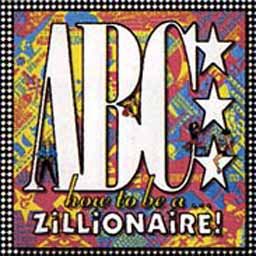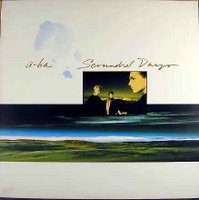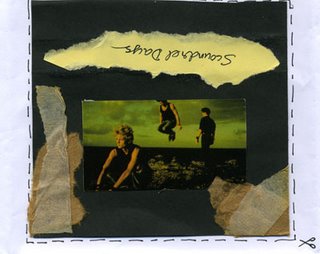ABC, "Ocean Blue (Atlantic Mix)" (1985)I was fifteen before I had a room to myself. Prior to that, my family lived in an apartment that was a reasonable size, but didn't have too many bedrooms. My mother did a wonderful job of taking care of my sister and me, and of my grandparents, who at points lived with us as well, while my father worked to provide for everyone. Although I had to share a room with my sister for the first fourteen years of my life, neither she nor I ever felt aggrieved about the lack of space. Indeed, neither of us really felt that we were wanting for much. That is less of a testament to us -- and especially to me -- and more to my parents, who are absolute heroes.
Nevertheless, it was pretty nice when we -- by this time just my parents, my sister, and me -- moved to another apartment. In a shocking act of generosity, I ceded the bedroom with the lovely view of water to my sister, who didn't even pretend to engage in a "No no,
you take it" charade, and took the other room, which had more of a
Rear Window vibe.
Perhaps it was because I was a prissy child (some would say, still is). Or perhaps it was because my parents had taught me to treasure things in general (for years, I used to wrap the cover of every book I bought in a kind of transparent plastic sheet, the better to reduce wear and tear. This is not as eccentric as it sounds: to this day many kids in this country still do it, and it warms my heart). But I never made my new room over into what one typically thinks of as a teenage-looking room. In particular, there weren't a million pop posters adorning the walls, nor was there some rebellious "Keep Out" sign hanging on my bedroom door. (Aside from the teens on American TV, does anyone actually do that?)
Eventually, one poster made it up onto the wall. And I think I only hung it after they invented Blu Tack and I could be certain that I wasn't going to damage the property. (Like I said: prissy.)

The poster was of ABC's
How To Be A Zillionaire! album cover. ABC was pretty much my favorite band in the 80s, rivalled only by, um, Thompson Twins. I loved
The Lexicon Of Love, of course, and, in an early act of music deviance,
Beauty Stab even more. And then came
Zillionaire, which I thought was, no question, their pinnacle. I still do: it's a wildly inventive record, a sort of postmodern pop album. From the opening stereophonic machine-gunny effect on "Fear Of The World," to the simply but infectious toy piano riff on "Be Near Me," to the unusual shuffle faux-Motown beat of "15 Storey Halo," to the doo-wop-goes-hip-hop sounds of my favorite track "Tower of London," through the two tear-inducing ballads that are "Ocean Blue" and "Between You And Me," there wasn't a single track that I truly disliked. (The only one that came close: the single "Vanity Kills," and that was as much because it perturbed me to hear the hitherto erudite Martin Fry be so horrifyingly ungrammatical: "Vanity kills/It don't pay bills.")
Quite aside from how much I loved the album, I also quite adored the cover art. At this time, ABC of course was in the phase of wanting to be pop-art cartoon characters, going so far as to induct into the band a bald little person and a former
Face journalist whose main function, it turns out, was to mutter the immortal line, "Hi! I'm Eden! I want you -- to kiss! My! Snatch!" I believe my thinking then was: well, if I'm going to put up a poster in my room, from where it
couldn't possibly
ever be taken down, it better be something that has enough elements to entertain me for years. (I'm telling you: pris. Sy.) If I remember right, I bought the poster from a record shop in town called, appropriately enough for our story about rooms,
The Attic. This was a infamously snobby store; they only stocked vinyl, which even in the mid-80s was beginning to look rather pointedly retrogressive. The store, while intimidating, entertained my friends and I for hours, because we were never sure if the person who worked there the most was a man, or a very severe and mannish woman.
It was Pat."Ocean Blue" is one of the highlights of
Zillionaire. This teen had no defense against its romantic inverted title and lush, romantic sound. When the song was wisely selected as the fourth single, I bought the
12", and on it was
this bewitching "Atlantic Mix." (It later became available on CD via
The Remix Collection.) The five-minute version begins with a "Brum-brum, PING!" sound that subtly marks its departure from the album version. From there, we go through what is essentially the 7" version, but then the remix becomes more apparent: an instrumental passage, some pizzicato strings, and a little gurgling bass part. About two minutes into the track, an extended orchestral part takes over: utterly gorgeous strings swoop in, a keyboard fades in and out like a memory, and a piano pounds, as the remix expands on what had been, on the album version, a short instrumental middle eight. Here on the remix, it goes on and on, and yet is not a second too long. When we finally return to the final two couplets -- "I stand at the head of the queue/This mutiny's every crew/Wishing and wondering 'bout you/Ocean blue" -- it feels aptly like we've gone on a long seafaring voyage only to find ourselves back at the start, changed and yet the same. And, to this day, the ABC poster still hangs in my old bedroom, in my parents' apartment.









